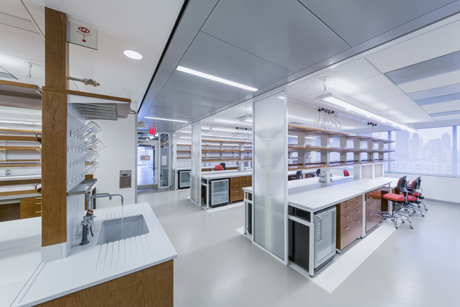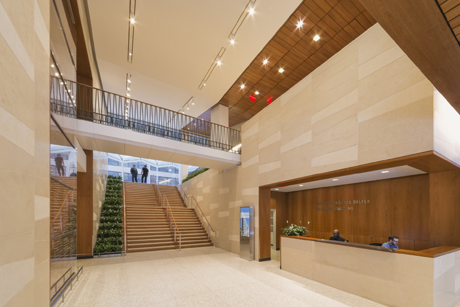Weill Cornell opens Belfer Research Building
By Alyssa Sunkin


NEW YORK — Weill Cornell Medical College has opened the Belfer Research Building, a facility that ushers in a new era for cutting-edge, translational science.
The 18-story, $650 million building, made possible through numerous donors, nearly doubles Weill Cornell’s existing research space and empowers scientists to turn groundbreaking discoveries into the most advanced patient care.
Weill Cornell will host a ribbon-cutting ceremony Jan. 31 that includes the Cornell Board of Trustees and the Weill Cornell Medical College Board of Overseers, as well as political leaders and friends who have supported the project. The ceremony will commemorate the building’s opening after seven years of fundraising and nearly four years of construction.
The 480,000-square-foot building, located at 69th Street and York Avenue, will house bench-to-bedside research targeting some of the most formidable health challenges of the 21st century, including cancer, cardiovascular disease, metabolic diseases, neurodegenerative diseases, children’s health, global health and infectious diseases.
Its proximity to the adjacent Weill Greenberg Center, the medical college’s flagship ambulatory care center, ensures that breakthroughs made in the laboratory can be quickly applied to patient care as improved treatments and therapies in the clinic. The Belfer Research Building will also serve as a nucleus where physician-scientists, educators, students and researchers from Weill Cornell and around the globe can collaborate.

“The Belfer Research Building is a monumental achievement for Weill Cornell, the city and the state of New York,” said Sanford I. Weill, chairman of the Weill Cornell Medical College Board of Overseers. “Through the remarkable generosity of our many donors – we received an impressive 154 gifts of $1 million or more to our campaign, including $100 million from Bob and Renée Belfer, for whom the building is named – Weill Cornell has been able to dramatically expand its research enterprise in record time. This building is a testament to the power of public-private partnerships, and the collaborative discoveries it promises will cement our role as one of the world’s leading centers for biomedical research.”
“Today marks an extraordinary milestone for Weill Cornell,” said Dr. Laurie H. Glimcher, the Stephen and Suzanne Weiss Dean of Weill Cornell Medical College. “Our new Belfer Research Building is an inspiring symbol of scientific breakthroughs that can advance patient care, enhance health and change lives. I am deeply appreciative of our loyal donors and friends, distinguished physicians and scientists, and our esteemed government and civic leaders, whose unwavering dedication and support is a testament to this building’s promise.”
“My wife, Renée, and I, along with our children and grandchildren, are deeply honored to have our name associated with such a noble effort and such a remarkable building,” said Robert Belfer. “This world-class facility will catalyze biomedical research discoveries and empower Weill Cornell’s brilliant scientists and our newest recruits to develop game-changing therapies that can transform human health.”
The Belfer Research Building includes 13 floors of laboratories, an open floor plan and thematic orientation, all designed to break down research walls and foster cross-disciplinary collaboration. Featured research hubs include the Helen and Robert Appel Alzheimer’s Disease Research Institute; Joan and Sanford I. Weill Center for Metabolic Health; Feil Family Brain and Mind Research Institute; Sandra and Edward Meyer Cancer Center; and the Joan and Sanford I. Weill Department of Medicine.
“The completion of the Belfer Research Building represents a major expansion of Cornell University’s footprint in New York City,” said President David J. Skorton, who is a professor in Weill Cornell’s Departments of Medicine and Pediatrics. “It opens the door to an even greater role for Weill Cornell physicians and researchers in benefiting the health and well-being of New Yorkers and many others around the globe. I am deeply grateful to everyone who helped make this building a reality, whether by skilled and dedicated work or through visionary philanthropy.”
The building also headquarters the Tri-Institutional Therapeutics Discovery Institute Inc., a partnership of Memorial Sloan-Kettering Cancer Center, The Rockefeller University and Weill Cornell Medical College that includes Takeda Pharmaceutical Co. to expedite early stage drug discovery into treatments and therapies.
Designed by Todd Schliemann, a founding partner and design principal for Ennead Architects, the Belfer Research Building uses sustainable materials, highly efficient mechanical systems and green construction. The building design maximizes natural light and effective space design to enhance quality of life within the building. Weill Cornell is seeking LEED (Leadership in Energy and Environmental Design) gold certification for the building.
Alyssa Sunkin is a writer at Weill Cornell External Affairs.
Media Contact
Get Cornell news delivered right to your inbox.
Subscribe